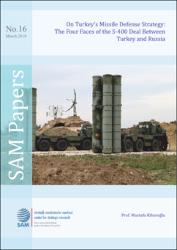Please use this identifier to cite or link to this item:
https://hdl.handle.net/20.500.11779/1030Full metadata record
| DC Field | Value | Language |
|---|---|---|
| dc.contributor.author | Kibaroğlu, Mustafa | - |
| dc.date.accessioned | 2019-03-22T13:41:26Z | |
| dc.date.available | 2019-03-22T13:41:26Z | |
| dc.date.issued | 2019 | - |
| dc.identifier.citation | Kibaroglu, M. (March, 2019). On Turkey's Missile Defense Strategy: The Four Faces of the S-400 Deal Between Turkey and Russia, SAM Papers No: 16, Turkish Ministry of Foreign Affairs, Center for Strategic Studies. | en_US |
| dc.identifier.uri | https://hdl.handle.net/20.500.11779/1030 | - |
| dc.description.abstract | The S-400 deal signed between Turkey and Russia has sparked an intense debate in the international arena, where harsh criticisms have been leveled against Turkey, extending from whether Turkey needs to spend billions of dollars to buy an air defense system whose effectiveness has not yet been entirely proven across a spectrum of air-borne threats, to how Turkey's longstanding alliance relationship with the US and its status in NATO as a prominent Ally might be severely damaged due to the country's increasing degree of rapprochement with Russia. Hence, this paper will, first of all, explain the reasons behind Turkey's desire to build an elaborate air defense structure, and discuss how and why its successive attempts to reach this objective in collaboration with the allied countries have failed. Second, the paper will highlight the major arguments behind the severe criticisms in the West concerning Turkey's negotiations, first with a Chinese firm, and then with a Russian firm, and how this entire process has become a serious bone of contention between Turkey and the US, carrying a risk of a spill over into NATO. Third, the paper will discuss why and how the severe sanctions threatened to be imposed on Turkish defense industries by the Trump administration will indeed damage the security and the defensive capability not only of Turkey, but also the United States. Fourth, the paper will elaborate on how the intense debate on the S-400 deal with Russia has become a politically motivating factor for young Turks to join the defense industries sector, and for the government to further support and sponsor domestic research and development projects in this field. Finally, the paper will conclude with remarks and recommendations with a view to finding a breakthrough in the strained relations between Turkey and US stemming from its decision to buy the Russian S-400 air defense system. | en_US |
| dc.language.iso | en | en_US |
| dc.publisher | Republic of Turkish Ministry of Foreign Affairs | en_US |
| dc.relation.ispartof | Center For Strategic Research | en_US |
| dc.rights | info:eu-repo/semantics/openAccess | en_US |
| dc.subject | S400 | en_US |
| dc.subject | Turkey | en_US |
| dc.subject | Russia | en_US |
| dc.title | On Turkey's Missile Defense Strategy: the Four Faces of the S-400 Deal Between Turkey and Russia | en_US |
| dc.type | Review | en_US |
| dc.authorid | Mustafa Kibaroğlu / 10107 | - |
| dc.authorid | Mustafa Kibaroğlu / C-2925-2019 | - |
| dc.authorid | Mustafa Kibaroğlu / 0000-0003-1147-9363 | - |
| dc.relation.publicationcategory | Other | en_US |
| dc.identifier.issue | 16 | en_US |
| dc.department | İİSBF, Siyaset Bilimi ve Uluslararası İlişkiler Bölümü | en_US |
| dc.institutionauthor | Kibaroğlu, Mustafa | - |
| item.cerifentitytype | Publications | - |
| item.openairecristype | http://purl.org/coar/resource_type/c_18cf | - |
| item.openairetype | Review | - |
| item.languageiso639-1 | en | - |
| item.grantfulltext | open | - |
| item.fulltext | With Fulltext | - |
| crisitem.author.dept | 04.04. Department of Political Science and International Relations | - |
| Appears in Collections: | Siyaset Bilimi ve Uluslararası İlişkiler Bölümü Koleksiyonu | |
Files in This Item:
| File | Description | Size | Format | |
|---|---|---|---|---|
| mustafakibaroglu_sampapers-no16_turkey-russia-s400_march2019.pdf | Yayıncı Sürümü - İnceleme Dosyası | 10.51 MB | Adobe PDF |  View/Open |
CORE Recommender
Page view(s)
64
checked on Nov 18, 2024
Download(s)
4
checked on Nov 18, 2024
Google ScholarTM
Check
Items in GCRIS Repository are protected by copyright, with all rights reserved, unless otherwise indicated.